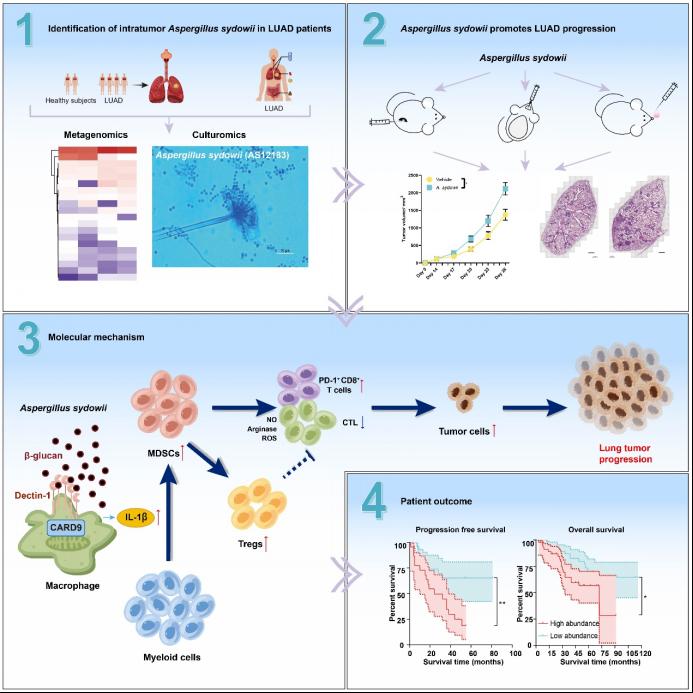On September 21st, Cancer Cell (IF=50.3), a leading international journal of oncology, published online a research paper titled "The intratumor mycobiome promotes lung cancer progression via myeloid-derived suppressor cells", by the joint team of Wang Hui/Liu Ningning of School of Public Health, Center for Single-Cell Omics, National Key Laboratory of Cancer Systems Medicine, which for the first time clarified the molecular mechanism by which fungi promote the development of lung cancer, has attracted wide attention in the field.
Abstract
Although polymorphic microbiomes have emerged as hallmarks of cancer, far less is known about the role of the intratumor mycobiome as living microorganisms in cancer progression. Here, using fungi-enriched DNA extraction and deep shotgun metagenomic sequencing, we have identified enriched tumor-resident Aspergillus sydowii in patients with lung adenocarcinoma (LUAD). By three different syngeneic lung cancer mice models, we find that A. sydowii promotes lung tumor progression via IL-1β-mediated expansion and activation of MDSCs, resulting in suppressed activity of cytotoxic T lymphocyte cells and accumulation of PD-1+ CD8+ T cells. This is mediated by IL-1β secretion via β-glucan/Dectin-1/CARD9 pathway. Analysis of human samples confirms that enriched A. sydowii is associated with immunosuppression and poor patient outcome. Our findings suggest that intratumor mycobiome, albeit at low biomass, promotes lung cancer progression and could be targeted at the strain level to improve patients with LUAD outcome.

Figure 1: Aspergillus sydowii induces the expression of CARD9 signaling pathway in host cells through β-glucan binding Dectin-1 in the cell wall, promotes the secretion of IL-1β and recruitment of downstream MDSCs cells, enhancing their ability to inhibit the killing of CD8+ T cells. Eventually, the formation of immunosuppressive microenvironment is induced, thus promoting the development of lung cancer.
In this study, School of Public Health was the first author and corresponding author institute, Shanghai Pulmonary Hospital Affiliated to Tongji University and Shanghai Institute of Immunization and Infection of Chinese Academy of Sciences were the co-first author and corresponding author institutes. Prof. Ningning Liu is the first author and co-corresponding author; Dr. Chengxiang Yi from the School of Medicine of Tongji University and Dr. Luqi Wei from the School of Public Health are co-first authors; corresponding authors are Professors Hui Wang, Ningning Liu, Peng Zhang and Changbin Chen. The research was supported by the National Key Research and Development Program of the Ministry of Science and Technology, the National Natural Science Foundation of China, the Shanghai Science and Technology Commission, the Shanghai Municipal Education Commission, and the Innovation Team of Shanghai High-level universities.
Original link: https://www.cell.com/cancer-cell/fulltext/S1535-6108(23)00288-X




